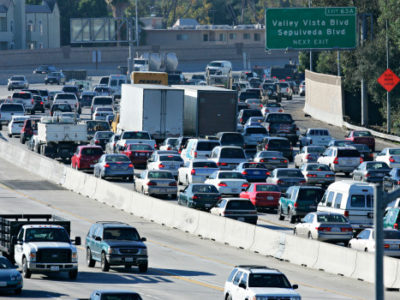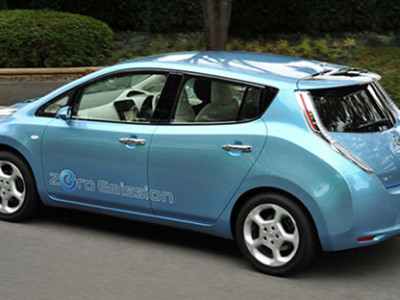Month: May 2019
ARPA-E: Surviving and Thriving Despite Trump
Trump keeps trying to kill it, but the energy innovation hub keeps on going.
In the long run, supporting energy innovation is among the most important things the federal government can do to address climate change. Naturally, Trump wants to end that. In what has become an annual ritual, his most recent budget proposal calls for eliminating the Advanced Research Projects Agency-Energy (ARPA-E). The agency’s mission is to support …
Continue reading “ARPA-E: Surviving and Thriving Despite Trump”
CONTINUE READINGCongestion Pricing in New York City: What Can California Learn?
California isn’t New York. But it should watch the city’s plan closely as it develops.
New York’s state legislature last month enacted legislation to institute the nation’s first congestion pricing plan in New York City. A new commission within the existing Metropolitan Transportation Authority will develop the plan’s structure and details over the next two years, so very few specifics are known at this time. But as cities in California …
Continue reading “Congestion Pricing in New York City: What Can California Learn?”
CONTINUE READINGPouring More Concrete Just Increases Traffic, Part The Millionth
In Other News, Water Is Wet
Department of Duh: Five years ago this month, a northbound carpool lane opened on the 405 freeway, between the 10 and 101 freeways, widening 10 miles of the interstate. It took half a decade to construct and cost more than $1 billion. Since then, average northbound drive times through the Sepulveda Pass have increased at all …
Continue reading “Pouring More Concrete Just Increases Traffic, Part The Millionth”
CONTINUE READINGFrom Brussels to the Bay: Sustainable Finance in the EU & California
Berkeley Law Conference on Thursday, May 23rd, with State Controller Betty Yee, European Commission Director Mario Nava & CLEE’s Dave Jones
Join Berkeley Law’s Center for Law, Energy and the Environment (CLEE) and the European Union for a roundtable discussion on regulatory developments in sustainable finance and responsible investment. Hear from European Commission Director Mario Nava, of DG FISMA (the European Commission department responsible for EU policy on banking and financial services) on the state of …
Continue reading “From Brussels to the Bay: Sustainable Finance in the EU & California”
CONTINUE READINGUnanswered Questions About Cost-Benefit Analysis
We have only fragmentary evidnece about how CBA actually functions in government decision-making.
Considering that people have been debating cost-benefit analysis at least since Reagan mandated its use in 1981, you would think we would have the answers to some basic questions about how it works. Yet we have very fragmentary information, generally based on the perspevtives of people at the agencies or in the White House Office …
Continue reading “Unanswered Questions About Cost-Benefit Analysis”
CONTINUE READINGHR 9: The First Climate Bill to Pass the House In a Decade
What you need to know about the bill.
Last Thursday, for the first time in a decade, the House of Representatives passed a climate change bill. HR 9, the Climate Action Now Act, passed on a vote of 231-190. The heart of HR 9 is section 3, which blocks the use of any federal funds to withdraw from the Paris Agreement. Section 4 …
Continue reading “HR 9: The First Climate Bill to Pass the House In a Decade”
CONTINUE READINGGroundwater Recharge in the SGMA Era
California clarifies beneficial use guidelines for recharge projects addressing SGMA undesirable results
Implementation of the Sustainable Groundwater Management Act (SGMA) was always going to be tricky. Part of the necessary growing pains of SGMA is determining how the revolutionary statute interacts with traditional tenets of water law. As with any other sweeping legislative change, SGMA does not provide direct answers for every practical question which arises as …
Continue reading “Groundwater Recharge in the SGMA Era”
CONTINUE READINGInternational Conference On Electric Vehicles & Urban Residents
Register Today For UC Berkeley Law Event On June 4th & 5th, Co-Organized By University of Paris
Policy makers and industry leaders have a tough challenge making electric vehicles accessible for the world’s urban residents. Many apartment dwellers lack access to dedicated spots with electricity to charge the vehicles, while other city residents may need access to shared EVs to get around city streets. Unless EV leaders can solve these challenges, global …
Continue reading “International Conference On Electric Vehicles & Urban Residents”
CONTINUE READINGIs Socialism Good for the Environment?
The answer is: “Sometimes yes, sometimes not so much.”
Some of the people who are most fervent about the environment these days describe themselves as socialists. But is socialism actually a good thing for the environment? That seems like a significant question in a political context where people on both sides are throwing around the word “socialist” so much, so I decided to see …
Continue reading “Is Socialism Good for the Environment?”
CONTINUE READINGSaved By The…Air Conditioner?
New Paper Proposes Carbon Sequestration From HVAC Systems
You have to like the idea carbon sequestration: if our ability to stop putting carbon into the atmosphere is limited, why not try taking it out? But it always seems to founder on a life-cycle analysis: it costs so much in energy to get the system working that you wind up producing more carbon than you …
Continue reading “Saved By The…Air Conditioner?”
CONTINUE READING













